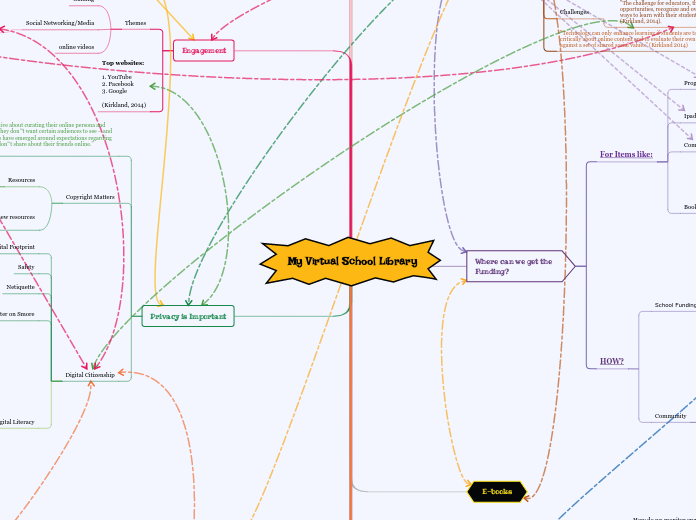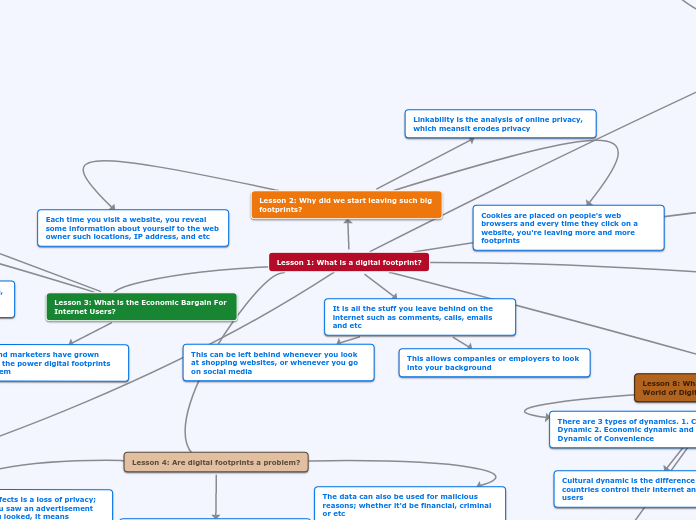My Virtual School Library
Cyberbullying
Define what Bullying actually is-- class presentation
Not as big of an issue that we may seem
Still needs to be taken into consideration
that as a part of a teenage life; drama will
follow and with the new ways to socialize
this can be a problem
Privacy is Important
Digital Citizenship
Digital Literacy
"Digital literacy is not about technical proficiency, but about developing the critical thinking skills that are central to lifelong learning and citizenship. To meet the challenge, schools must focus on pedagogy, and provide training and support to help teachers incorporate technologies into all elements of the curriculum in ways that facilitate individualized learning and teach students how to collaborate with learners both within and outside the school community."
MediaSmarts (2012). YCWW Phase III,
Teachers’ Perspectives.
http://mediasmarts.ca/digital-media-literacy/general-information/digital-media-literacy-fundamentals/digital-literacy-fundamentals
Digital Citizen Newsletter on Smore
*present to staff in staff meeting
*make available on school communication website
(ie/ Edsby
Netiquette
Safety
Digital Footprint
Copyright Matters
Staff Meetings for "Tech Time" to share new resources
and talk about any Copyright issues
Have a copy of Copyright Matters available to anyone
(put in central location in the library)
Resources
Grom Social
Common Sense Media
“Students are very proactive about curating their online persona and controlling content that they don‟t want certain audiences to see – and a number of social norms have emerged around expectations regarding what friends share, and don‟t share about their friends online.” (Kirkland, 2014)
Engagement
Top websites:
1. YouTube
2. Facebook
3. Google
(Kirkland, 2014)
Themes
online videos
Social Networking/Media
Canadian youth love to
socialize online
Library Blog?
How can we integrate this into lessons/curriculum?
References Used:
Kirkland, A. (2014). Myths, Realities and Opportunities: What the Research Says about Digital Literacy. Retrieved from: https://learn.etfo-aq.ca/content/enforced/51026-A4613E/assets/docs/TMC2014_DigitalLiteracy_ABK.pdf?_&d2lSessionVal=KIBzDo1iSJJX0wZOr1L2QB9bI&ou=51026
Bring Your Own Device (BYOD)
Students have more access to information
through the Smartphones
many older have their own device
School policy on damaged items?
School policy on lost/stolen items?
How do we monitor engagement and on task
behaviours?
E-books
Where can we get the
Funding?
HOW?
Community
Letter to Community partners outlining
what the money would be used for
Apps
Gaming
Makerspace
Donations/Partnerships
School Funding
Fundraisers
Theme Week
Spirit Weeks
Book Fair
School Funds per classroom
School Council
For Items like:
Books
Different divisions
Different Levels
Recommended
Popular
Computers
Relevant?
"Portable devices are used more than desktop computers, with cell phones and smart phones being the primary devices for access. Older teens are far more likely to own mobile phones than younger students." (Kirkland, 2014).
Ipads
Programs/Software
Special programs for those with disabilities
accessible to all
Technology
"Technology can only enhance learning if students are taught to think critically about online content and to evaluate their own behaviour against a set of shared social values" (Kirkland 2014)
Challenges
"The challenge for educators, then, is to understand the real needs and opportunities, recognize and overcome their own biases, and explore ways to learn with their students using networked digital technology" (Kirkland, 2014).
Teacher of new ideas and resources to
*colleagues
*students
model learning with and about tech
willingness to be open and try new things
embrace opportunity
challenge stereotypes and fears
Life-long learner
leader in promoting Digital Citizenship
"Instructional approaches to digital literacy and digital
citizenship must be informed by the current research to be useful to meaningful student learning and consequent deepening of digital learning literacy" (Kirkland, 2014)









